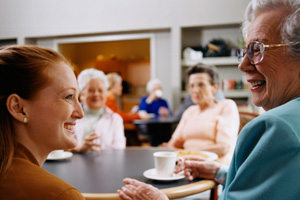
Housing options
Independent living is a desire of many, if not most, people with disabilities. A number of devices can help people with disabilities perform daily tasks needed to stay living at home. Many of these devices are easy to install and low-cost. Often, products cost less at local hardware and plumbing or electrical supply stores than through disability-related product suppliers. These devices include:
- Ramps to help people avoid steps
- Lever door handles that replace round knobs for people with limited use of their hands
- Bathtub grab bars to prevent falls
- Seat-lifting chairs for people who have difficulty standing up because of back problems or weak legs
An occupational therapist can visit your home and make suggestions about which devices might make your life easier.
Modifying an existing home to support a person with a short- or long-term disability isn't always possible. For instance, doorways and halls might be too narrow for a wheelchair to fit through. Or remodeling a bathroom or kitchen might cost too much. More and more, people who design and build homes are adopting principles of "universal design." This is not a style, but rather a concept of design that meets the range of functional needs of all types of people. This makes day-to-day living safer and also makes it possible for people to "age in place." Some elements of universal design include:
- Wide doorways and halls
- Bathrooms and kitchens that can be adapted at a low cost to support people with changing functional abilities
If you are not able to live on your own or need help with daily living, there are several options:
-
Group homes are houses or apartments where two or more people with disabilities live together. They help each other perform tasks of daily living. Group home businesses also have staff who visit the homes and help residents.
-
Assisted-living facilities provide a variety of services, including housekeeping, laundry, meal preparation, and transportation. They have staff who are available 24 hours to help as needed.
-
Nursing homes are for people with more severe disabilities who need 24-hour nursing care. Nursing homes also often have doctors on staff.
More information on housing options
Explore other publications and websites
-
Directory of Centers for Independent Living and Statewide Independent Living Councils (Copyright © Independent Living Research Utilization) — Use this map to find Centers for Independent Living (CILs) and other resources near you.
http://www.ilru.org/html/publications/directory/index.html
-
Fair Housing and Equal Opportunity: Disability Rights and Resources — This page answers frequently asked questions on the housing rights of people with disabilities and the responsibilities of housing providers and building and design professionals under federal law.
http://www.hud.gov/offices/fheo/disabilities/index.cfm
-
Guide to Choosing a Nursing Home — This booklet has information for people that have Medicare and are trying to find a nursing home.
It has steps to take when choosing a nursing home and how to make arrangements, payments, and other important information.
http://www.medicare.gov/Publications/Pubs/pdf/02174.pdf
-
Home Modifications Promote Independent Living (Copyright © American Occupational Therapy Association) — This article explains how an occupational therapist helped one man make changes to his home to help him do everyday tasks more easily. It explains how occupational therapy can help you and links to other information from the American Occupational Therapy Association.
http://www.aota.org/Consumers/Professionals/WhatIsOT/RDP/Articles/HomeMod.aspx
-
Housing Opportunities for Persons With AIDS (HOPWA) Program — Learn about HOPWA, which helps to provide housing assistance and related supportive services to people with HIV/AIDS and their families.
http://www.hud.gov/offices/cpd/aidshousing/programs/index.cfm
-
Living With Vision Loss: Adapting Your Home (Copyright © American Foundation for the Blind) — This guide provides basic advice for people with vision loss about making their environment safe and well organized.
http://www.afb.org/Section.asp?SectionID=40&TopicID=217
-
Modifying Your Home for Independence (Copyright © American Occupational Therapy Association) — This publication describes how an occupational therapist can help individuals and families modify their homes by recommending and implementing strategies that help a person complete daily tasks.
http://www.aota.org/Consumers/consumers/Adults/HomeMods/35182.aspx
-
People With Disabilities — Visit this web page to learn about renting, buying and making your home accessible, and about your Fair Housing rights.
http://www.hud.gov/groups/disabilities.cfm
-
Services for Adults With Disabilities (Copyright © National Dissemination Center for Children with Disabilities) — This publication helps adults with disabilities find organizations and resources that can assist them with employment, postsecondary education, recreation, independent living, and assistive technology.
http://www.nichcy.org/FamiliesAndCommunity/Pages/servicesadults.aspx
Connect with other organizations
-
ABILITY Awareness
http://www.abilityawareness.org/index.html
-
Accessible Space, Inc.
http://www.accessiblespace.org/
-
Alliance for Technology Access
http://www.ataccess.org/
-
Independent Living Institute
http://www.independentliving.org/
-
Independent Living Research Utilization
http://www.ilru.org/
-
Institute for Human Centered Design
http://www.HumanCenteredDesign.org
-
National Council on Disability
http://www.ncd.gov/
-
National Institute on Disability and Rehabilitation Research, ED
http://www.ed.gov/about/offices/list/osers/nidrr/index.html?src=mr
-
Technical Assistance Collaborative
http://www.tacinc.org/
-
U.S. Department of Housing and Urban Development
http://www.hud.gov/
Content last updated September 22, 2009.
Resources last updated September 22, 2009.
womenshealth.gov
A federal government website managed by the Office on Women's Health in the Office of the Assistant Secretary for Health at the U.S. Department of Health and Human Services.
200 Independence Avenue, S.W. • Washington, DC 20201


 Text size
Text size Email
Email
